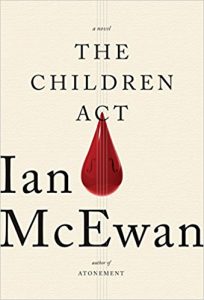McEwan’s The Children Act: The Novel or the Movie?
 I’ve never been eager to see movies based on books, mostly because they never live up to the original, but I’m willing to make an exception when Emma Thompson is the star. That’s how I found myself at a showing this week of The Children Act, an almost-excellent film based on the novel of that name by Ian McEwan.
I’ve never been eager to see movies based on books, mostly because they never live up to the original, but I’m willing to make an exception when Emma Thompson is the star. That’s how I found myself at a showing this week of The Children Act, an almost-excellent film based on the novel of that name by Ian McEwan.
The film and the book both come to life in the opening scenes. We meet Fiona, a British High Court judge in the Family Division, wrestling with multiple cases that defy easily solutions, even as she’s confronted with a crisis in her marriage. Her husband of 35 years, frustrated by Fiona’s lack of interest in sex, has just demanded that she let him have an affair with a younger woman. At fifty-nine, he insists on one last chance at passion, and if Fiona won’t oblige, he’s already found someone who will. Feeling humiliated, betrayed, and afraid, Fiona naturally refuses. And when Jack packs a bag and leaves, she wastes no time in having the locks on the doors changed.
While this is playing out, Fiona is confronted with a harrowing case—whether Adam Henry, a Jehovah’s witness with leukemia, should be forced to undergo a blood transfusion that will likely save his life and possibly allow a full recovery. Adam wants to obey the tenets of his religion (and his parents) and refuse the transfusion, even though it will almost certainly mean a slow and painful death. But Adam is not old enough to make that decision on his own. He’s three months shy of eighteen, the age that would put him beyond the reach of The Children Act, a British law meant to safeguard the welfare of minors.
The case lands in Fiona’s courtroom, with the hospital warning that waiting more than 24 hours will severely reduce the chances of restoring Adam’s health. After hearing arguments from the doctors who want to treat Adam and the parents who do not, Fiona rushes to the hospital to meet Adam in hopes of determining for herself whether he is acting out of his own beliefs or because he’s been unduly influenced by the beliefs of his parents and church elders who have been visiting him daily in the hospital.
While the visit helps Fiona make her decision, it hardly puts an end to her dilemma. In fact, the repercussions, which fill the second half of the novel, present a new ethical dilemma. As in many of the cases that fill Fiona’s docket, doing the right thing is never easy and even in hindsight, it’s far from clear whether she made the right choice. I’ve always been a fan of ethical-dilemma novels (which is obviously why I write them), and while McEwan’s novel is much more than that, it was the ethical minefield he created that made it difficult for me to put The Children Act down.
The beauty of the novel is not just in the content, however. McEwan’s prose is nothing short of remarkable —strong, smooth, nuanced, with an elegance you won’t find in many courtroom dramas. There are moments when a reader might fear that the novel is about to take a polemical path, ridiculing religion and faith, but it never falls into that trap. The arguments and choices are presented with objectivity and tact, despite the emotional baggage they carry, and the reader is free to decide on his or her own whether Fiona does the right thing at several key points.
 Much of that nuance is beautifully brought to the screen by Emma Thompson’s performance. Her face and subtle action can convey a mood and struggle that may take up paragraphs in the novel. Other actors in the film are less successful, particularly Stanley Tucci, whose depiction of a whiny, selfish husband doesn’t do justice to the more nuanced character in the novel who wants more from his marriage, both physically and emotionally.
Much of that nuance is beautifully brought to the screen by Emma Thompson’s performance. Her face and subtle action can convey a mood and struggle that may take up paragraphs in the novel. Other actors in the film are less successful, particularly Stanley Tucci, whose depiction of a whiny, selfish husband doesn’t do justice to the more nuanced character in the novel who wants more from his marriage, both physically and emotionally.
McEwan wrote the screenplay for the movie and in most instances, he sticks closely to the dialogue and specifics of the novel. But there are two significant changes in the way the ending is revealed that I thought leaned too close to melodrama. I wonder whether those were forced on an unwilling McEwan. I can’t help but hope so.
If you have to choose one or the other, I strongly recommend the novel. But the movie is not a bad substitute. Or tackle them both and see if you agree.
Mark Willen
Mark Willen’s novels, Hawke’s Point, Hawke’s Return, and Hawke’s Discovery, were released by Pen-L Publishing. His short stories have appeared in Corner Club Press, The Rusty Nail. and The Boiler Review. Mark is currently working on his second novel, a thriller set in a fictional town in central Maryland. Mark also writes a blog on practical, everyday ethics, Talking Ethics.com.
- Web |
- More Posts(48)